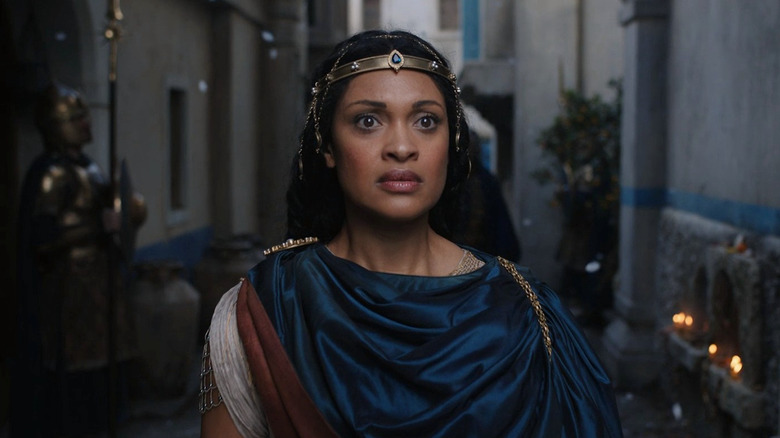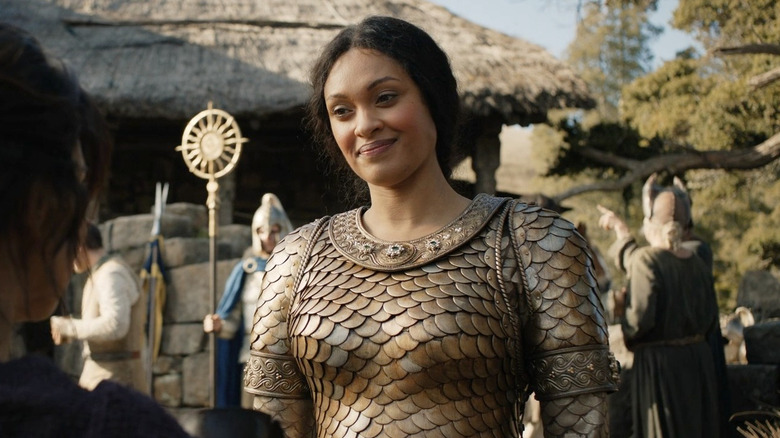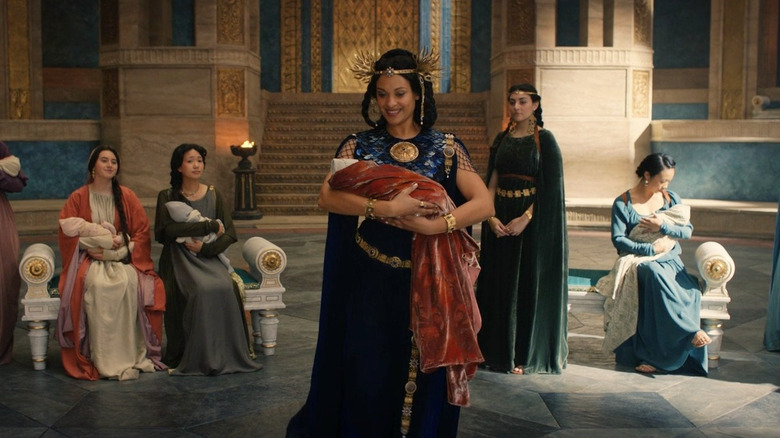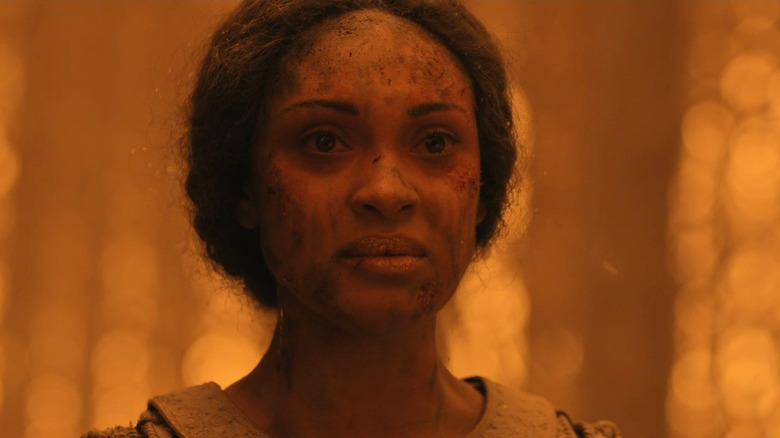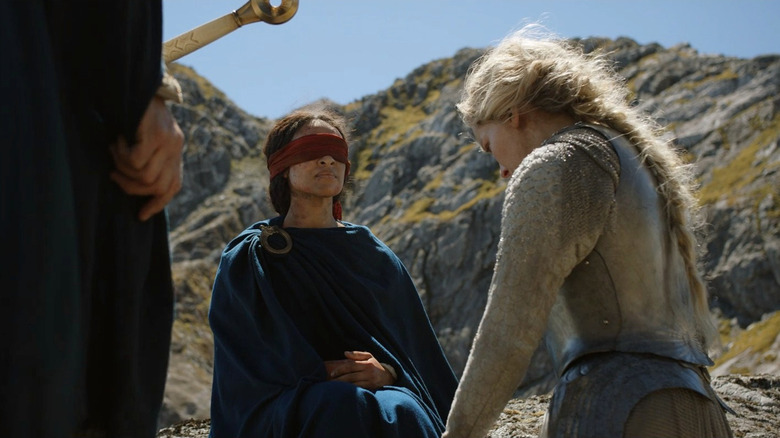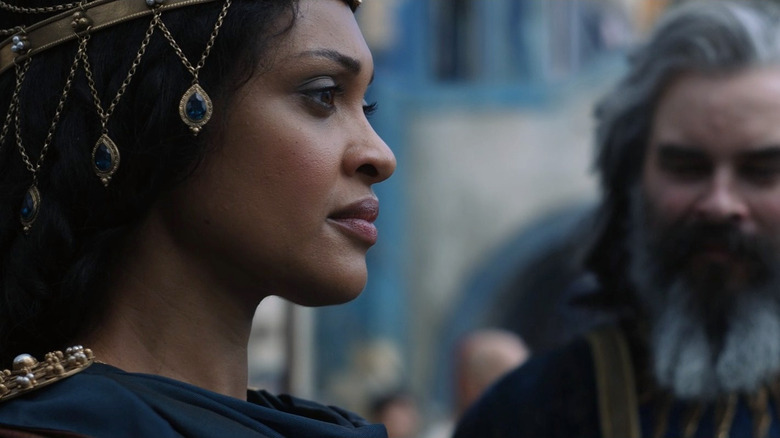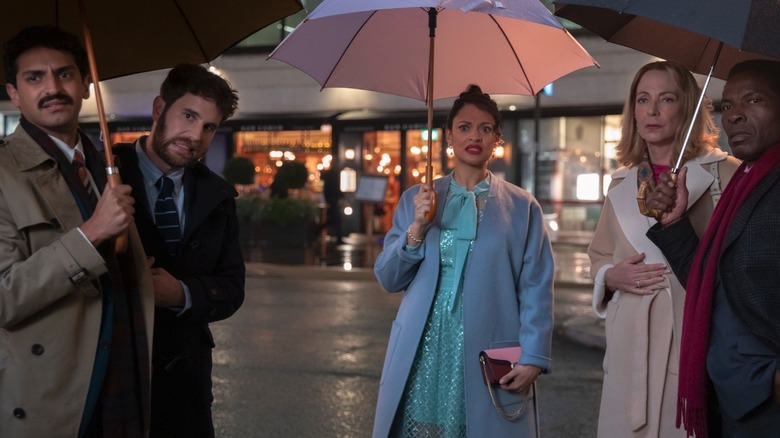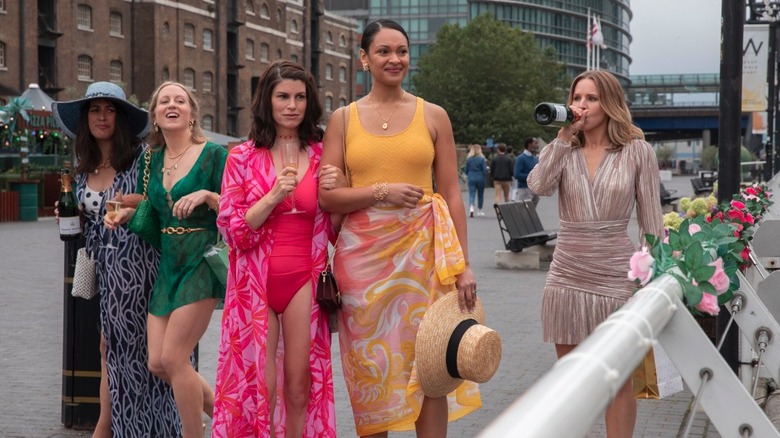Cynthia Addai-Robinson Goes Deep Into Rings Of Power And The People We Hate At The Wedding [Interview]
Spoilers ahead for season 1 of "The Lord of the Rings: The Rings of Power."
Cynthia Addai-Robinson has spent a lot of time in the fantasy realm. She played Naevia in "Spartacus," Amanda Waller in "Arrow," and now Tar-Míriel in Prime Video's "The Lord of the Rings: The Rings of Power," which just completed its first season. Now she's starring in the Prime Video comedy "The People We Hate at the Wedding" along with Kristen Bell ("The Good Place"), Allison Janney ("Mom"), and Ben Platt ("Dear Evan Hansen"). The film tells the story of Eloise (Addai-Robinson), who clashes with her family on the eve of her wedding. It's a big departure in terms of recent projects, and a whole lot of fun.
I got a chance to speak to Addai-Robinson about her role in the film, working with comedy heavy hitters, and how she's been speaking with a British accent for quite a while now. (She was born in London but moved to the U.S. very young, so her regular accent is American.) We also went deep into how she won the role of Tar-Míriel, filming in New Zealand, her on-set "Spartacus" reunion, working with John Macmillan (aka Ser Laenor Valaryon from "House of the Dragon"), and so much more.
'I had initially read for the show, pre-pandemic, for a different role'
This interview has been lightly edited for clarity and brevity.
You were cast [in "Rings of Power"] during lockdown. I would love to know how that worked.
Gosh, I mean, I guess the way this [referring to our Zoom call] is working now, right? With the power of technology, which comes in handy. But yeah, in thinking back to that time, I had initially read for the show, pre-pandemic, for a different role. So I had sort of gotten far enough along and had been in contact with the showrunners. I think I did a Zoom call with them as well. And then it went away.
So when this role of Míriel came up, I did an audition tape before the pandemic, and then the pandemic came along, and it just sort of put a pause on everything. So I wasn't necessarily thinking about it, because nobody really knew what the future held at that point. Then it was, I believe, the summer of 2020, so lockdown had been going for a few months at that point. I did a chemistry read with my fellow castmate, Trystan Gravelle, who plays opposite me as Pharazon. And we were both fortunate enough to get that fateful call, and then off I went to Middle-earth.
Oh, that's awesome. And she's a little different than she is in the book. So were you aware of this character, and was it really the research you did that informed this or the script itself?
I wasn't aware of the character, and in fact, I didn't know much about the story of Númenor. And when I was cast, the role had a fake name to it, so I didn't even know who I was auditioning for. So obviously, when I did find out, and when I found out about our part of the world, which is essentially Tolkien's take on the legend of Atlantis, I had the faintest idea when people hear that — the name of that legendary, mythical place, you know it's an island, it has a tragic outcome. So I did some digging into, essentially, how Tolkien interpreted that myth.
As far as the character of Míriel, there was a real opportunity between what the showrunners had come up with and collaborating with them in terms of, "How do you fill in the blanks of this character?" There's a minimal amount that Tolkien established in the lore in regards to her journey and her arc. But in season 1 of "Rings of Power," we're obviously looking at the sort of prelude, if you will, to a lot of things that are going to happen in this part of the world. So I am fortunate that with this material, there are so much in the way of resources, in the way of just endless amounts of writing, that you can pull bits that connect with you to create a character, essentially.
'Luckily, we have a dedicated [Tolkien] shelf at home'
I had read that your husband and your friends were big Tolkien fans. Did they help with your research? Could you even talk to them about it?
Luckily, my husband was with me. So when we went to New Zealand, he was one of the very few people, I mean, really the only person other than my castmates and the people working on the production. And luckily, we have a dedicated shelf at home, so we obviously couldn't bring the shelf to New Zealand, but my husband was a massive, massive fan and knew the material definitely better than myself. Again, just the fact that I know that this material, in general, holds so much importance, but for a lot of people, it's really defined their own coming of age and just how the material resonates with them in different parts of their life.
So it's really a genuine pleasure to be a little bit older and accessing this material now because it's speaking to things that, as an adult, I can navigate through this material. Whereas for a lot of people, it's when they're — maybe they're a child that's just old enough to start understanding some of the legends, and some of the stories, maybe more with "The Hobbit," and things are a bit more accessible. But definitely, for the people in my life who are fans of this, they are very, very excited that I am now a part of this legendarium.
It's so cool. I never ask about costumes, but I feel like it's okay this time because they're so spectacular. But your costumes, and a lot of them in the show, really seem like they're based on pre-Raphaelite art. What were your thoughts when you first saw them?
Well, what's really great is I didn't necessarily get to see the costume before I arrived. It essentially was almost custom-built on my person. So it, of course, stands to reason that a production like this requires a massive wardrobe department. It was spearheaded by Kate Hawley, who, from her brain, sprung all of these incredible creative designs. But her — aside from using the resource material, what Tolkien described, there definitely were a lot of references from art, art history. I remember walking into her workspace, and she just had this incredible visual montage of paintings, and just different textures and references to other cultures. So you get this really great mix of things that are drawn from real cultures, real history, and just pure imagination. But these costumes are essentially couture pieces, because there were many, many iterations before you get to the final result, and you can see all of the effort and work. You have a lot of people executing this vision as well. So cobblers, and people doing embroidery, people welding. It was really awe-inspiring, actually, to see.
'There really was that effort, even for areas that the audience wasn't necessarily going to see'
Oh wow. And did you notice any particular symbols? I just keep looking at the antler headdress and the armor. Are there little things in there that you want people to notice?
There's definitely a lot of Easter eggs in all of the various costumes in different parts of the world. Obviously with Númenor being a sort of marine island environment, even some of the armor where you've got the sort of shell and scale motifs, there's specificity to the environment. But what I love is when you have costumes like this — I literally was just on Instagram today, and I saw somebody who had done a Halloween costume of one of the first costumes, I think, I appeared with that amazing antler headdress, which was handmade by a jeweler that we had working on the show, Jasmine [Watson]. And it's just so inspiring, because when you see people really freeze frame the show so they can look closely at the detail and then they replicate it out of cardboard, out of plastic, it's pretty cool. It's what you hope if you've done your job right.
The other thing with Easter eggs is you had this Númenor set, and a lot of it was practical, which is mind-blowing. I know there were some things about the layers and that the older, lower layers are more Elvin. Are there little things in there that you want people to pick up on?
Yeah. I mean, the production design and that idea of, you have a society that is essentially at this crossroads, and so you have these traditional elements — elements that are almost crumbling, or graffiti that's been painted over, attempts at modernization on top of older parts of the city. And you see that in real life. You have heritage buildings potentially being encroached on by modern condos, is sort of a good parallel. But it's meant to be a visual representation of these two ideas: Holding onto tradition and how that defines a society, versus progress and innovation and moving forward and tearing down the old to build the new.
So that is very much in line with the story that Númenor presents, or at least one of the ideas. So when you would walk down some of these alleyways and literally see that in the design, just that patina, really, just the crumbliness, or somebody said there was even a person who's responsible for bird poop, which I heard somebody else mention that and I was like, "Oh, I guess I wasn't looking out for that." But it just goes to show that there really was that effort, even for areas that the audience wasn't necessarily going to see or even the camera was going to see. To be able to walk through a set like that, it really does help you just be there, really be thrust into that environment.
'A lot of the first scenes I had played were those blind scenes'
What did you think when you finally got to see Míriel's vision on the screen? That was wild.
I have to give a big shout-out to just the post [production] and all the people who do the visual effects, because we had all of these amazing practically built sets, and then you've got a little bit of that blue screen/green screen because there's this other element that gets put on top. And so yeah, of course, I didn't see the big crashing wave until I watched the show myself, and it looked amazing. On the day, it's just a giant fan and a blue curtain. But yeah, I think what's really great about the end result of the series is that you had all of these artisans doing practical work, practically built sets, props, effects, and then that other piece, the advances, technologically speaking, in visual effects so that you want to be able to use those artists and what they do and kind of marry these two things so that it all feels really seamless, which I think we really managed to achieve.
Totally. And playing blind is always a difficult thing, but it was really interesting because if you go back and rewatch the episode, you can see that moment. But I'd love to know, did you do research into that? Was it just having the blindfold?
Yeah, I mean, what was really interesting for me is that when I was cast, I didn't know that was going to be part of her journey and part of her story, and just because of the logistics of how they had to film the show, my first day was in episode 7, and a lot of the first scenes I had played were those blind scenes. So that was really intimidating for me because I really wanted to make sure that I could, not just convincingly inhabit that and portray that, but make sure that it was something that did not lend itself to self-pity. I didn't want this part of her story to be about a tragic event that happens to her and then it weakens her. And so there was an interesting opportunity to really tell the story of acknowledging and accepting a situation and somehow using it to your advantage or learning to work within that situation.
I remember when I was told that this was going to be part of this character's story, I thought, "Oh wow, okay, that's an amazing twist, and it gives me a lot of food for thought." And at the time, I was limited in terms of going out into the world, just because there was so much secrecy. If anyone knew that I, as an actor, was sort of attempting to ask questions or go to, say, a school for the blind, that, potentially, was going to give a lot of information away. So I was able to speak to an individual and try to just ask questions around what that does in terms of your mindset. Because in a lot of ways, it sort of brings your world within. And also, you have your heightened senses to experience the world through the other senses. As a creative choice and challenge for this character, there's definitely a lot to mine, but I also love the idea of it becoming an asset as opposed to a perceived weakness.
'It's really shaped me and changed my life, personally and professionally'
We've heard reports that this show has a planned five-season arc. So do you have a sense of where she's going? I mean, I know you can't reveal things, but do you know?
I don't, actually. What's great is, again, you have the lore. I mean, Míriel is one of the characters that's part of the canon. So people can do the deep dive and see where she ends up in the storyline. I don't actually know what those five seasons would entail. Definitely, if you catch up with the showrunners and you find anything out, then you can pass it along the way. [laughs]
Totally will! Did anybody in the cast ever make it to Hobbiton while you were down there?
You know what's so wild? I have had two opportunities to go to Hobbiton, and I think in my mind, I was like, "Oh, I'm going to get there, I'm going to get there." And my husband and I actually traveled extensively through New Zealand, and we didn't make it to Hobbiton, which is so crushing. But the landscape in New Zealand in general, and even a lot of some of the landscape that we captured on the show, it sort of fills you in that same way of it just really informs a lot of these vastly different parts of Middle-earth that feel like they have equivalence, certainly in the New Zealand landscape.
Any opportunity we got to just take off for a weekend and just roam the country, we did. And it always felt like a very spiritual grounding. As you know, when I worked on "Spartacus," that also filmed in New Zealand. I've somehow been gifted all this time that I've gotten to spend there, and it's really shaped me and changed my life, personally and professionally, to get to be in a country like New Zealand. It gets me in this really special spiritual place, and definitely, I think it comes through in the show as well.
With "Spartacus," there's all this fighting around, there's fight training and all of that. Did you have to do any of that for "The Rings of Power?"
I did a little bit of training. I was doing a bit more horse riding this time around. But what was really beautiful, especially for me, with the timing of things, I left lockdown to then embark on this journey with "Rings of Power." And as you know, with New Zealand, it was a closed border, so anybody who entered did two weeks of quarantine, and then once you were released, you were kind of released into New Zealand, which at the time, wonderfully, was Covid-free, essentially. So there was a semblance of normal life. Some of my first meetings in pre-production, when I would walk into the stunt department or when I would go meet the guys who were doing all the horse training, were people that had worked on "Spartacus." There were a lot of familiar faces. [The] New Zealand film and television industry is a really close-knit community.
So to see people that I had trained with on "Spartacus" in the stunt department, the horse wranglers, hair and makeup, there were so many people that it just gave me such a boost, because I was feeling quite fragile to come from lockdown for many, many, many months to then be thrust into this situation. I worked really closely with the stunt department on "Spartacus." A lot of incredible performers and people who train that we were lucky enough to have on "Rings of Power." So I was hoping to get in there a little bit more, but I guess when you're Queen, you sort of delegate those responsibilities to other people. [laughs]
'Major 180 from Rings of Power'
I absolutely loved "The People We Hate at the Wedding." It was not what I expected at all. One of the things that was so cool about it is these are messy people. It is not cleaned up. So can you talk a little bit about your thoughts on the script and about [your character] Eloise?
Yes. Yeah, major 180 from "Rings of Power." What was really great was that as I was finishing "Rings of Power," I got approached to do "The People We Hate at the Wedding." And what was exciting was just the opportunity to get to play in this type of a story, because I really haven't had the chance to flex my comedy chops in many years, to do something that was contemporary, just set in the here and now in London. I'd never gotten the chance to film in London before, so it was my first time filming in London. And just getting the opportunity to have my relatives be Allison Janney, Kristen Bell, and Ben Platt, I was like, "Sign me up for that, please." And I think that the timing of this movie coming out right around or before Thanksgiving and before the holidays, I think highlights the fact that we always take pleasure in seeing other people's dysfunctional families. So maybe we don't feel as bad about our own.
They're pretty dysfunctional.
Yeah, they are pretty dysfunctional. And I think what's great about it too, is there's the dysfunction and the comedy within that, but then there's also a lot of heart and just that idea that within families, when there's that misunderstanding, you want the chance, even if it's messy and ugly and emotional, to confront family baggage and do so that you could move past it and get to the other side. And I think that this is a really great story that captures that. And of course, weddings being one of those highly charged situations that bring out all kinds of things is sort of the perfect setup. So I play this character Eloise, it's her wedding. So I had the privilege of having an English countryside wedding, which was great. And just getting the chance to really play a bit of the straight-man character to this insane, wacky, wonderful family.
I love that the person your character is marrying is from the other huge show — from "House of the Dragon." So did you guys bond over the whole idea of being in these blockbusters?
Oh, absolutely. I mean, when I met John [Macmillan, who plays Laenor Velaryon], and it's funny because I've been messaging him, because I finally finished "House of the Dragon" so I could be like, "Okay, I have questions, now we can talk." But when we were both first cast, and we knew that we were both working on these big fantasy shows, it was kind of that thing of like, "Oh, we're both in the 'we can't talk about our show' club." That's a nice club to be in. So I knew that he was on "House of the Dragon," I didn't know much else. So it was really wonderful to finally watch it and see him in it. And same for him: He gets a completely different character as my husband in the film. And I guess for those who are really eagle-eyed, they can spot Laenor and Míriel getting married in the English countryside.
'I basically spent all of 2022 with the British accent'
And, of course, as you said, you had Kristen Bell and Allison Janney. This cast is great. So were there things that you picked up on for future comedy?
Yeah, I mean, what I really appreciate about the entire cast, and especially for those who are really known for their comedy chops, I think the best comedic actors are also the ones who can pivot when those moments come that are a bit more sort of serious. That there is also the flip side of it, which is the pain, the painful situation that these characters are navigating. So I think with this film, the laugh out loud moments are truly that, but there's a lot of pain and angst that each of these people are carrying around with them.
As far as my character, Eloise, everyone thinks she's perfect, she's aspirational, she has this perfect life. And of course, as we come to find out, she's got her own stuff that she's navigating and dealing with. But I think the hardest thing, obviously, is you're working with people who are hilarious, and are riffing, and just riffing on this really great script, and you're just trying not to break character and you're trying to kind of be as fast as they are because it's really about listening to everybody and trying to pick up.
So it's almost like a sport where someone's throwing a ball around and you just don't want to be the one to drop it. And of course, our director, Claire Scanlon, who is our great leader in this, she just created an environment that felt really playful. So it helps that you can just kind of go with a crazy scenario and just keep riffing on it. Like the hot tub floating down on the water of the Thames, which was our first day of filming on the movie.
Oh my God.
So, yeah.
Wow. So do you want to do more comedy? Because you were hysterical in this.
Oh, thank you ... I would. Yeah. I was navigating both the comedic part of things, as well as this character is British. And what was interesting for me is I was born in London, moved to the U.S. when I was very young; obviously, I sound the way that I sound [she has an American accent in real life]. But it was interesting because there was also this aspect of where this character and me as Cynthia sort of have this overlap. So you've got these two cultures that sort of pull within, or even three, in both her case and my own. And so I think that American and British push and pull is something I very much relate to.
But yeah, even just, I've never been asked to play a British character either, so it's like I basically spent all of 2022 with the British accent, because between "Rings" and "The People We Hate at the Wedding," I just didn't sound like myself, literally for an entire year. Not quite like Lady Gaga in "House of Gucci" accent. I went back to myself on the weekends. But at work on both of those projects, I did try to stay in that accent, because it does change your perception of how you experience a person through their voice. So even for the cast, because I knew they were American, I didn't want them to hear me like this. I wanted them to hear me with this sort of posh British accent, which they did until the very last day. And then it was like, "Oh my God, that's what you sound like."
"The Lord of the Rings: The Rings of Power" is currently streaming on Prime Video. "The People We Hate at the Wedding" premieres on Prime Video on November 18, 2022.
